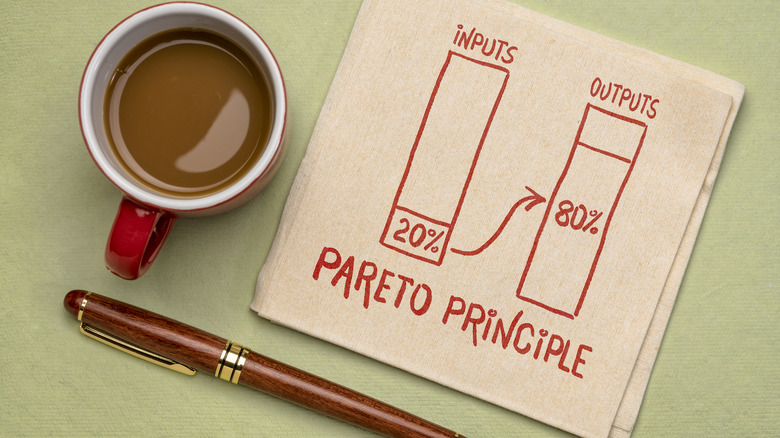How The '80/20 Audit' Can Improve Your Life
Do you ever feel a sense of burnout? It's almost as if you're going through life on autopilot. You wake up in the morning, spend time on social media, reply to some messages, get ready for work, head out, spend your allocated hours there, and return home to unwind and repeat the entire process the next day. You feel like you're busy and possibly being productive (that's the reason why you couldn't make it to your parents' anniversary dinner, right?), yet, you're always tired and just not happy.
There are plenty of resources out there that will tell you how to fix this cycle of living. Perhaps they'd be about setting work and home-life boundaries. Maybe they'd revolve around taking up yoga or a meditative practice. While all of these behaviors are greatly beneficial, there's also another older principle that took shape in the early 1900s when an economist from Italy had a revelation in his garden. His name was Vilfredo Pareto and his theory was that 80% of output came from 20% of his vegetation. Gradually, he began to observe similar patterns in trade and society at large.
Today, various scholars and even TikTok influencers have pulled from the principle to bring order to various areas of life — from time management and healthy eating to assignments for school.
Understanding the 80/20 audit
The first step to understanding the 80/20 audit would actually be to hit pause on autopilot mode and take a few minutes to yourself. If it helps, bring out a notebook and pen to jot things down. As a starting point, think about how you spend your time. You have 24 hours in a day. What's something that gives you a lot of happiness that you spend only a few hours doing each day? Is it spending time with family? Is it reading? What's something that gives you only 20% of joy but you dedicate 80% of your day to? The answer could be your job, scrolling through social media, or even something like procrastination.
Now try moving on to a different area of your life — for example, friends. Who are the few people in your life that give you the greatest fulfilment? Are there groups of people you unconsciously spend a lot of your time with but they don't add anything to your life? Once you've got the hang of it, you can try asking similar questions pertaining to different segments of your life — a work project that isn't yielding the results you want, your fitness goals that aren't seeing a payoff, etc.
Chances are you'll arrive at answers that'll put things in perspective. The idea is to do more of the things that bring you joy, yield you results, or help you attain your goals, and less of the things that don't.
How to apply the Pareto principle to improve your life
Now you understand how to ask the important questions. Remember that you don't have to get stuck on the exact percentages when you're thinking of responses. The idea is to differentiate between more and less. Once you've noted those down, it's time to make some changes.
Author and blogger Mark Manson wrote, "It doesn't occur to us that there's an efficiency to every aspect of our life, to everything we do. And not only is there an efficiency, but we have control and influence over that efficiency. It's something we can take responsibility for and improve." And while this notion might not be as simple if your answer to one of the questions above would be that your job which you spend 85% of your time on is something that actually gives you only 15% of fulfillment, the fact that matters is that it puts things in perspective. You could create small, actionable goals toward finding a profession or career that is more aligned with your purpose and who you are.
If being around water improves your mood, then find ways to carve out time to do that more often. If going for your parents' anniversary would have given you a sense of togetherness you long for, get off work early and prioritize that the next time. You may just see how transformative the results can be, when you start to audit your life this way.


